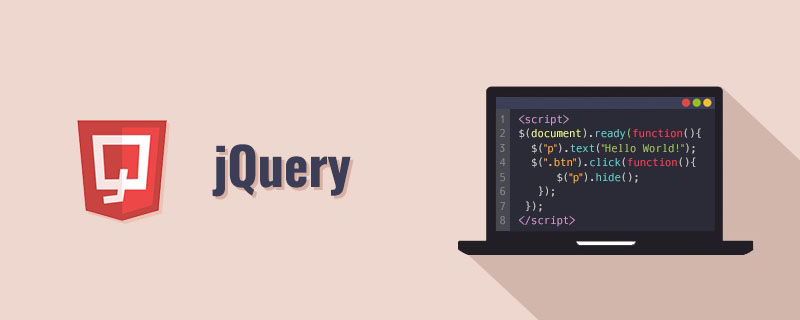 Web Front-end
Web Front-end JS Tutorial
JS Tutorial Example analysis of delegate and undelegate of JQuery event delegation mechanism
Example analysis of delegate and undelegate of JQuery event delegation mechanismConsider the following scenario: If there are 3 buttons under 1 p, when each button is clicked, the ID of the current button needs to be printed.
<p id="parent"> <input type="button" id="a" value="1"></input> <input type="button" id="b" value="2"></input> <input type="button" id="c" value="3"></input> </p>
Method 1: Use JQuery selector to bind its own event handling function to each button.
$("#parent :button").click(function(){
alert($(this).attr("id"));
})
Method 2: Use the event delegation mechanism to only bind events to the parent element of the button.
$("#parent").delegate(":button","click",function(){
alert($(this).attr("id"));
});
The function signature of delegate API is as follows:
##
delegate(selector, [type], [data], fn)
selector :
represents the selector in JQuery, used to filter elements that trigger events. There are three buttons a, b, and c below the parent element above. If button b is clicked, its ID will not be printed. Then it can be achieved through the following code:
$("#parent").delegate(":button[id!='b']","click",{},function(){
alert($(this).attr("id"));
});
type:
Appended to the element One or more events, with multiple event values separated by spaces.
data
The parameter value passed to the event handling function.
$("#parent").delegate(":button","click",{name:123},function(event){
alert(event.data.name);
});
fn
The handler function called when an event occurs.
delegate() also has a very important property: event handlers using the delegate() method apply to elements that currently exist or will be added in the future.
In the following code, when we click the test button, a new button will be generated. When this newly generated button is clicked , its id will still be printed.
##<script src="jquery-1.11.1.js"></script>
<script>
$(function(){
$("#parent").delegate(":button","click",function(event){
alert($(this).attr("id"));
});
$("#test").click(function(event){
$("#parent").append('<input type="button" id="d" value="4"></input>');
});
})
</script>
<body>
<input type="button" id="test" value="test">
<p id="parent">
<input type="button" id="a" value="1"></input>
<input type="button" id="b" value="2"></input>
<input type="button" id="c" value="3"></input>
</p>
</body>
So how does delegate() do it
Woolen cloth? It's very simple, using the event bubbling mechanism in javascript. When a child element generates an event, if the propagation of this event is not prohibited, then the parent element will also perceive this event (the event handler on the parent element is called). And through the Eventobject, you can get the element that originally triggered the event. In the code below, we have implemented a simple event delegation mechanism ourselves.
<script src="jquery-1.11.1.js"></script>
<script>
$(function(){
$("#parent").click(":button",function(event){
// target是最初触发事件的DOM元素。
var domId = event.target.id;
// 过滤元素
var filter = event.data;
if($(event.target).is(filter))
{
alert(domId);
}
});
})
</script>
<body>
<p id="parent">
<input type="button" id="a" value="1"></input>
<input type="button" id="b" value="2"></input>
<input type="button" id="c" value="3"></input>
<input type="text" id="d" value="d"></input>
</p>
</body>
delegate and undelegate are very similar to bind and unbind. Here is a mention: when using undelegate to cancel event delegation , you can also use the event
namespace mechanism. This article uses bind and unbind as examples to introduce the event namespace mechanism and how to use it in detail.
The above is the detailed content of Example analysis of delegate and undelegate of JQuery event delegation mechanism. For more information, please follow other related articles on the PHP Chinese website!
 jquery实现多少秒后隐藏图片Apr 20, 2022 pm 05:33 PM
jquery实现多少秒后隐藏图片Apr 20, 2022 pm 05:33 PM实现方法:1、用“$("img").delay(毫秒数).fadeOut()”语句,delay()设置延迟秒数;2、用“setTimeout(function(){ $("img").hide(); },毫秒值);”语句,通过定时器来延迟。
 jquery怎么修改min-height样式Apr 20, 2022 pm 12:19 PM
jquery怎么修改min-height样式Apr 20, 2022 pm 12:19 PM修改方法:1、用css()设置新样式,语法“$(元素).css("min-height","新值")”;2、用attr(),通过设置style属性来添加新样式,语法“$(元素).attr("style","min-height:新值")”。
 axios与jquery的区别是什么Apr 20, 2022 pm 06:18 PM
axios与jquery的区别是什么Apr 20, 2022 pm 06:18 PM区别:1、axios是一个异步请求框架,用于封装底层的XMLHttpRequest,而jquery是一个JavaScript库,只是顺便封装了dom操作;2、axios是基于承诺对象的,可以用承诺对象中的方法,而jquery不基于承诺对象。
 jquery怎么在body中增加元素Apr 22, 2022 am 11:13 AM
jquery怎么在body中增加元素Apr 22, 2022 am 11:13 AM增加元素的方法:1、用append(),语法“$("body").append(新元素)”,可向body内部的末尾处增加元素;2、用prepend(),语法“$("body").prepend(新元素)”,可向body内部的开始处增加元素。
 jquery中apply()方法怎么用Apr 24, 2022 pm 05:35 PM
jquery中apply()方法怎么用Apr 24, 2022 pm 05:35 PM在jquery中,apply()方法用于改变this指向,使用另一个对象替换当前对象,是应用某一对象的一个方法,语法为“apply(thisobj,[argarray])”;参数argarray表示的是以数组的形式进行传递。
 jquery怎么删除div内所有子元素Apr 21, 2022 pm 07:08 PM
jquery怎么删除div内所有子元素Apr 21, 2022 pm 07:08 PM删除方法:1、用empty(),语法“$("div").empty();”,可删除所有子节点和内容;2、用children()和remove(),语法“$("div").children().remove();”,只删除子元素,不删除内容。
 jquery怎么去掉只读属性Apr 20, 2022 pm 07:55 PM
jquery怎么去掉只读属性Apr 20, 2022 pm 07:55 PM去掉方法:1、用“$(selector).removeAttr("readonly")”语句删除readonly属性;2、用“$(selector).attr("readonly",false)”将readonly属性的值设置为false。
 jquery on()有几个参数Apr 21, 2022 am 11:29 AM
jquery on()有几个参数Apr 21, 2022 am 11:29 AMon()方法有4个参数:1、第一个参数不可省略,规定要从被选元素添加的一个或多个事件或命名空间;2、第二个参数可省略,规定元素的事件处理程序;3、第三个参数可省略,规定传递到函数的额外数据;4、第四个参数可省略,规定当事件发生时运行的函数。


Hot AI Tools

Undresser.AI Undress
AI-powered app for creating realistic nude photos

AI Clothes Remover
Online AI tool for removing clothes from photos.

Undress AI Tool
Undress images for free

Clothoff.io
AI clothes remover

AI Hentai Generator
Generate AI Hentai for free.

Hot Article

Hot Tools

Dreamweaver Mac version
Visual web development tools

Safe Exam Browser
Safe Exam Browser is a secure browser environment for taking online exams securely. This software turns any computer into a secure workstation. It controls access to any utility and prevents students from using unauthorized resources.

Zend Studio 13.0.1
Powerful PHP integrated development environment

SAP NetWeaver Server Adapter for Eclipse
Integrate Eclipse with SAP NetWeaver application server.

SublimeText3 English version
Recommended: Win version, supports code prompts!





